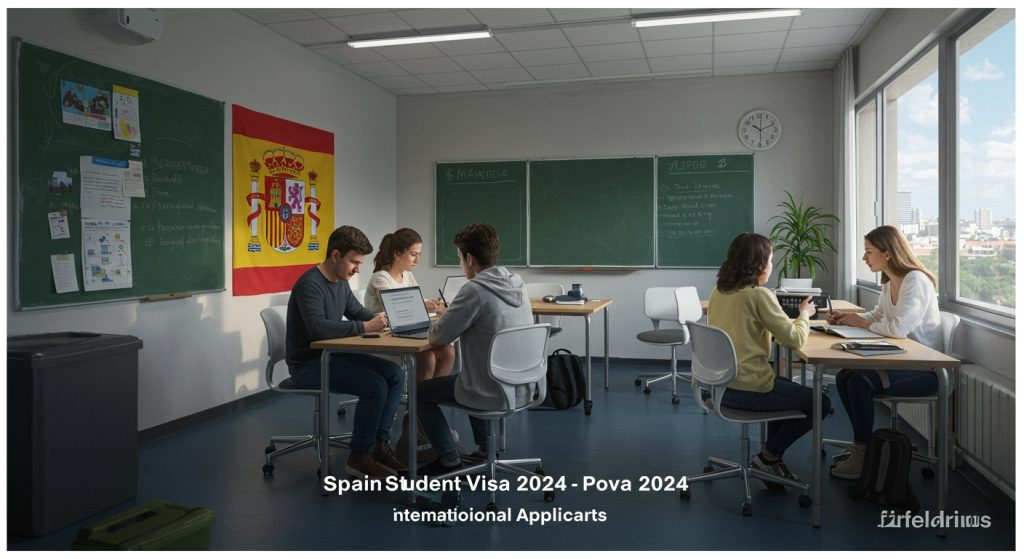Dreaming of studying at the University of Barcelona, the Complutense University of Madrid, or perhaps the University of Valencia? Spain’s higher education system, increasingly popular with international students, offers incredible opportunities. Navigating its application process can feel like deciphering a complex code. Forget generic advice; we’ll focus on the specifics: Did you know that the “Nota de Corte,” or cut-off grade, fluctuates annually based on demand and exam performance, impacting your chances significantly? Also, recent updates prioritize specific Bachillerato subject choices for certain degree programs. Understanding the homologation of your foreign qualifications, the nuances of the UNEDasiss accreditation. Even regional variations in application deadlines is crucial for success. Let’s unlock the secrets to a successful application, ensuring your academic journey in Spain starts smoothly.

Understanding the Spanish University System
Navigating the university system in Spain can seem daunting at first. Understanding its structure is key to a successful application. The Spanish higher education system is largely based on the European Higher Education Area (EHEA), following the Bologna Process. This means degrees are structured into three main cycles: Grado (Bachelor’s), Máster (Master’s). Doctorado (Doctorate).
- Grado (Bachelor’s Degree): Typically lasts four years (240 ECTS credits). This is the entry point for most international students.
- Máster (Master’s Degree): Usually one to two years (60-120 ECTS credits). It provides specialized knowledge in a specific field.
- Doctorado (Doctorate): This is the highest academic degree and involves research leading to a dissertation.
Spanish universities are primarily public, with a few private institutions. Public universities are generally more affordable. Admission can be highly competitive. Regardless of whether you choose a public or private university in Spain, it’s crucial to grasp the specific entry requirements for international students.
Essential Documents for International Students
Preparing the necessary documentation is a critical step in the application process. The specific documents required can vary slightly depending on the university and your country of origin. Generally, you’ll need the following:
- Passport and Visa: A valid passport is essential. Non-EU citizens will need to apply for a student visa. The visa application process can be lengthy, so start early.
- Academic Transcripts: Official transcripts from your previous educational institutions. These must be translated into Spanish by a certified translator.
- High School Diploma/Bachelor’s Degree: Depending on the program you’re applying for, you’ll need to provide proof of completion of your previous degree. For Bachelor’s programs, this is your high school diploma. For Master’s programs, it’s your Bachelor’s degree.
- Official Translations: Any document not originally in Spanish must be officially translated. This translation must be certified by a sworn translator (Traductor Jurado) recognized by the Spanish Ministry of Foreign Affairs.
- Homologation/Equivalence: This process validates your foreign qualifications as equivalent to the corresponding Spanish qualifications. For Bachelor’s degrees, you’ll typically need to homologate your high school diploma. For Master’s degrees, you may need to demonstrate the equivalence of your Bachelor’s degree.
- Language Proficiency Certificate: Most universities require proof of Spanish language proficiency. The DELE (Diploma de Español como Lengua Extranjera) is a widely recognized certification. Some programs may also accept other certifications or offer their own language proficiency tests.
- Application Form: Complete the university’s application form accurately and thoroughly.
- Letter of Motivation/Statement of Purpose: This is your opportunity to explain why you want to study at that particular university and in that specific program.
- Letters of Recommendation: Some programs may require letters of recommendation from teachers or professors.
Real-world example: A student from the United States applying to a Bachelor’s program at the University of Barcelona needed to first have their high school diploma evaluated for equivalence to the Spanish Bachillerato. They then had to pass the university entrance exam (Selectividad/EBAU) or have their SAT scores converted.
Navigating the Homologation and Equivalence Process
Homologation and equivalence are crucial steps for international students seeking to study at a University in Spain. These processes ensure that your foreign qualifications are recognized as equivalent to Spanish qualifications.
- Homologation: This is the official recognition of a foreign academic qualification as equivalent to a specific Spanish qualification. Typically, this applies to your high school diploma for Bachelor’s programs. The process is managed by the Spanish Ministry of Education.
- Equivalence: This process assesses whether your foreign degree is comparable to a Spanish degree, allowing you to access Master’s programs. The requirements for equivalence can vary depending on the university.
Steps for Homologation:
- Gather all required documents, including your original high school diploma, official transcripts. Certified translations.
- Complete the application form provided by the Spanish Ministry of Education.
- Pay the required fee.
- Submit the application and documents to the Spanish Ministry of Education or a designated office (e. G. , the Spanish Embassy or Consulate in your home country).
- Wait for the resolution. This process can take several months.
Tips for a Smooth Homologation/Equivalence Process:
- Start early, as the process can take several months.
- Ensure all documents are complete and accurately translated.
- Contact the Spanish Ministry of Education or the university for clarification if needed.
The Selectividad/EBAU: University Entrance Exam
For Bachelor’s programs, non-EU students often need to pass the Selectividad, now known as the Evaluación del Bachillerato para el Acceso a la Universidad (EBAU). This is the Spanish university entrance exam.
- What is the EBAU? The EBAU assesses your knowledge and skills in various subjects. It’s designed to ensure that students are prepared for university-level studies.
- Who needs to take it? Generally, students whose high school qualifications have been homologated as equivalent to the Spanish Bachillerato. But, specific requirements may vary, so check with the university.
- Exam Structure: The EBAU typically consists of compulsory and optional subjects. Compulsory subjects usually include Spanish Language and Literature, a foreign language, History of Spain. A core subject related to the student’s chosen field of study.
Alternatives to the EBAU:
- UNEDasiss: The Universidad Nacional de Educación a Distancia (UNED) offers a service called UNEDasiss, which allows international students to convert their high school grades into the Spanish grading system and take specific competency tests instead of the full EBAU. This is a popular option for many international students.
- SAT Scores: Some universities accept SAT scores as an alternative to the EBAU. Check with the university to see if this is an option.
Preparation Tips:
- Start preparing well in advance.
- Familiarize yourself with the exam format and content.
- Consider taking a preparatory course.
- Practice with past papers.
Language Proficiency: Proving Your Spanish Skills
Demonstrating sufficient Spanish language proficiency is essential for most programs at a University in Spain. While some universities offer programs in English, the majority require students to be proficient in Spanish.
- DELE (Diploma de Español como Lengua Extranjera): This is the most widely recognized Spanish language proficiency certification. It’s offered by the Instituto Cervantes and is available at various levels (A1, A2, B1, B2, C1, C2). Most universities require a B2 level for undergraduate programs and a C1 level for postgraduate programs.
- SIELE (Servicio Internacional de Evaluación de la Lengua Española): This is another recognized certification that assesses Spanish language proficiency.
- University-Specific Tests: Some universities offer their own Spanish language proficiency tests. Check with the university to see if this is an option.
Tips for Improving Your Spanish:
- Take Spanish language courses.
- Immerse yourself in the Spanish language and culture.
- Practice speaking with native speakers.
- Watch Spanish movies and TV shows.
- Read Spanish books and newspapers.
Real-world example: A student from the UK wanted to study at a University in Spain but had limited Spanish skills. They enrolled in an intensive Spanish language course and obtained a B2 DELE certificate before applying to the university. This significantly strengthened their application.
Application Deadlines and Key Dates
Staying on top of application deadlines and key dates is crucial for a successful application. Missing a deadline can mean waiting another year to apply.
- Application Periods: Application periods vary depending on the university and program. Generally, the application period for Bachelor’s programs starts in the spring (March-May) for the following academic year (September). Master’s programs may have multiple application periods throughout the year.
- Homologation/Equivalence Deadlines: As the homologation/equivalence process can take several months, it’s essential to start this process well in advance of the application deadline.
- Visa Application: Non-EU students need to apply for a student visa. The visa application process can be lengthy, so start as soon as you receive your acceptance letter from the university.
How to Stay Organized:
- Create a timeline with all key dates and deadlines.
- Set reminders for each deadline.
- Check the university’s website regularly for updates.
- Contact the university’s international admissions office if you have any questions.
Financial Considerations: Tuition Fees and Scholarships
Understanding the costs associated with studying in Spain and exploring scholarship opportunities is essential for planning your finances.
- Tuition Fees: Tuition fees vary depending on the university, program. Your nationality. Public universities are generally more affordable than private universities. Tuition fees for Bachelor’s programs at public universities typically range from €700 to €3,000 per year. Master’s programs can range from €1,500 to €4,000 per year.
- Living Expenses: Living expenses in Spain vary depending on the city. Major cities like Madrid and Barcelona are more expensive than smaller cities. Expect to spend around €700 to €1,200 per month on living expenses, including accommodation, food, transportation. Personal expenses.
Scholarship Opportunities:
- Spanish Government Scholarships: The Spanish government offers various scholarships for international students.
- University-Specific Scholarships: Many universities offer scholarships for international students. Check the university’s website for more insights.
- External Scholarships: Explore external scholarship opportunities offered by organizations and foundations in your home country.
Example Scholarship Programs:
- Erasmus+ Programme: Offers scholarships for students from EU countries to study in Spain.
- Fundación Carolina Scholarships: Offers scholarships for postgraduate students from Latin America to study in Spain.
Conclusion
Navigating Spanish university admissions might seem like a complex puzzle. With a clear understanding of the requirements, like homologating your prior qualifications and acing the PCE UNEDasís exams, you’re already halfway there. Remember, each university might have slightly different weighting for aspects like your grades or specific subjects relevant to your chosen degree. Don’t underestimate the power of early preparation. Start gathering your documents and researching program-specific requirements well in advance. I personally found that creating a detailed timeline helped me stay organized and avoid last-minute stress. Also, recent trends show an increased emphasis on demonstrating language proficiency, so consider investing in a DELE or SIELE certification [https://www. Dele. Org/]. Finally, remember that your application is more than just grades; it’s a reflection of your passion and potential. Showcase your unique skills and experiences. Don’t be afraid to let your personality shine through. Believe in yourself, embrace the challenge. Prepare to say “Hola!” to your Spanish university adventure.
More Articles
Crafting Compelling Statements: How to Make Your Application Truly Stand Out
Decoding University Admissions: Understanding Key Criteria for a Successful Application
Maximize Your Score: Effective Test-Taking Strategies for Entrance Exams
Ace Your Entrance Exam: Proven Study Habits and Time Management Tips
FAQs
So, what exactly do I need to get into a Spanish university as an international student?
Okay, think of it like this: it’s a few key pieces. First, you’ll need your secondary school diploma or equivalent. This needs to be officially translated and ‘homologated’ – , recognized as equivalent to the Spanish Bachillerato. Then, most non-EU students need to take the PCE exams (Pruebas de Competencias Específicas), which are subject-specific entrance exams. And finally, you’ll need to prove your Spanish language proficiency.
Homologation… sounds complicated. What’s the deal with that?
It can be! Homologation is just the process of getting your foreign qualifications officially recognized as equivalent to a Spanish diploma. You’ll need to submit your original diploma, transcripts. Certified translations to the Spanish Ministry of Education. It can take some time, so start the process early!
PCE exams? What subjects are we talking about. Are they tough?
The PCE exams are subject-specific tests. The ones you take depend on the degree program you’re applying for. Think of them like mini-AP exams. Common subjects include Spanish Language, Mathematics, History. A foreign language (usually English). Whether they’re ‘tough’ depends on your preparation. Focused study is definitely needed!
Spanish proficiency – how good do I really need to be?
Pretty good! Most universities require proof of Spanish language proficiency at a B2 level according to the Common European Framework of Reference (CEFR). This means you can interpret complex texts, participate in discussions. Express yourself clearly. You can prove this with a DELE exam or a certificate from an approved language school.
What if my degree program is taught in English? Do I still need Spanish?
Even if the degree is in English, some universities still might require a basic level of Spanish for daily life and integration. Always check the specific program requirements carefully. Plus, even if it’s not mandatory, learning Spanish will make your experience in Spain much richer!
Is there a central application portal, or do I apply to each university separately?
You typically apply to each university directly. There isn’t one central application system for all Spanish universities, which means you’ll need to research the specific application process for each institution you’re interested in. This can be a bit more work. It also gives you more control over your choices.
Okay, this all sounds like a lot. What’s the one piece of advice you’d give me?
Start early! Seriously, the application process can be lengthy, especially with homologation and language exams. Give yourself plenty of time to gather documents, prepare for the PCEs. Complete the applications. You’ll be much less stressed, I promise!



